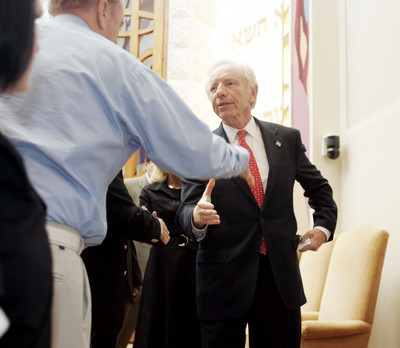Lieberman defends split
Despite it all, Sen. Joe Lieberman still considers himself a Democrat.
"I do, I do," he said in an interview Monday. "Though I'm a disappointed Democrat because the Democratic Party has left some of the fundamental policies that it followed, not only when I joined it when President Kennedy was the leader of the party, but frankly just eight years ago, when President Clinton was the leader of the party. I'm talking about a willingness to reform."
Lieberman, a longtime Connecticut senator who was the Democrats' 2000 vice presidential nominee, was in Las Vegas on Monday to campaign for the Republican presidential nominee, John McCain.
His support for McCain has further alienated Lieberman from a Democratic Party he already had a fractured relationship with.
Having split from the party to support Republicans on the Iraq war, Lieberman angered anti-war Democrats and lost his 2006 Senate primary in his home state. He ran and won re-election as an independent candidate instead.
He remains a registered Democrat and caucuses with Democrats in the Senate, where he leads the Homeland Security Committee. But many in the party regard him as a traitor, particularly after he spoke in support of McCain at the Republican convention.
"The Democratic Party I'm afraid has become too much of a status-quo party, beholden to special-interest groups, and that means, for instance, that the party has become an anti-trade party," he said Monday morning, as the convulsions racking Wall Street prompted reflection on the economy.
In that regard and when it comes to national security, he said, he believes Democrats have lost their way. "On the other hand, there's a lot that I agree with the party on, and I've been a lifetime Democrat," he said.
"Instead of quitting I've decided to stay and fight for the kind of Democratic Party I believe in, to bring it back to where it was under Kennedy and Clinton. But in the meantime, there's a very important election, and to me, ironically, I think when it comes to foreign policy and economic policy and homeland security policy, John McCain's actually, of the two major candidates, closer to John F. Kennedy and even Bill Clinton."
Lieberman lamented the polarization he blames for the federal government's dysfunction, saying, "To shake it up, to fix it, to get Washington working again is going to take somebody who has a proven record not only of working across party lines, but being willing to take on powerful interests within his own party."
On the economy, he said, McCain "will want to fight people who are cheating or greedy, like the people on Wall Street who created the problem we're in. He believes in regulation. That is to say, the government has to be effectively a policeman on the economic beat."
Republican economic policies under President Bush are not to blame for the current economic troubles, he said. Rather, they're the result of "cycles of growth that rise and fall" as well as "greed."
The American people, he maintained, want bipartisan cooperation, and Democrats know that.
"So their response is to try to make McCain into George Bush. But he's not," Lieberman said. "He's totally his own man and a different kind of man, and he'll be a different kind of president."
Among those angered by Lieberman's Republican convention speech in Minnesota earlier this month was Nevada Democrat Harry Reid, the Senate majority leader, who felt Lieberman went out of his way to badmouth the Democratic nominee, Barack Obama. Lieberman called Obama inexperienced and asserted that he had not reached across party lines, something Obama's campaign disputed.
Lieberman said he and Reid have talked since Congress reconvened last week, but not about that.
"Look, I know Harry Reid and other Democrats are unhappy that I'm supporting John McCain, and I understand they're unhappy, because I'm doing something unconventional," he said. "In one of the most partisan periods of American government, I've crossed party lines to support the candidate of the other party because to me country matters more than party."
Reid aides have suggested Lieberman's committee chairmanship is not safe if Democrats win a bigger Senate majority in November, as is expected. Lieberman said he did not know what the future could hold in that regard, "and I must say, at this moment it doesn't worry me. What worries me is who's going to be our next president."
He added, "Ultimately, that'll be up to my Senate Democratic colleagues. I can live with whatever happens, because I feel so strongly about the importance of electing John McCain our next president, I'm just not worried about whatever the political consequences might be for me."
Lieberman, an observant Jew, spoke Monday at Temple Beth Sholom in Las Vegas, where he told an audience of about 200 people about his close friendship with McCain and his disdain for partisanship. Introducing Lieberman, state Sen. Bob Beers, R-Las Vegas, talked him up as a potential Cabinet member under a McCain presidency.
Las Vegan Linda Reiff, 66, came to see Lieberman speak. She said she always has admired him because he is Jewish like her and because "he speaks his mind."
Reiff said the most important issue to her is abortion rights, which she favors. The anti-abortion views of McCain and his running mate, Alaska Gov. Sarah Palin, give her pause. But she considers Palin "a breath of fresh air" and plans to vote for the Republican ticket.
"I don't trust Obama," she said. "I don't like his friends."
Nevada Democratic Party Chairman Sam Lieberman, no relation to the senator, also attended the speech and found it "misguided."
"I"m thinking of changing my name," he joked. "He doesn't represent the change that people in Nevada are demanding."
Contact reporter Molly Ball at mball @reviewjournal.com or 702-387-2919.
ON THE WEB View slide show of Lieberman's visit.

















